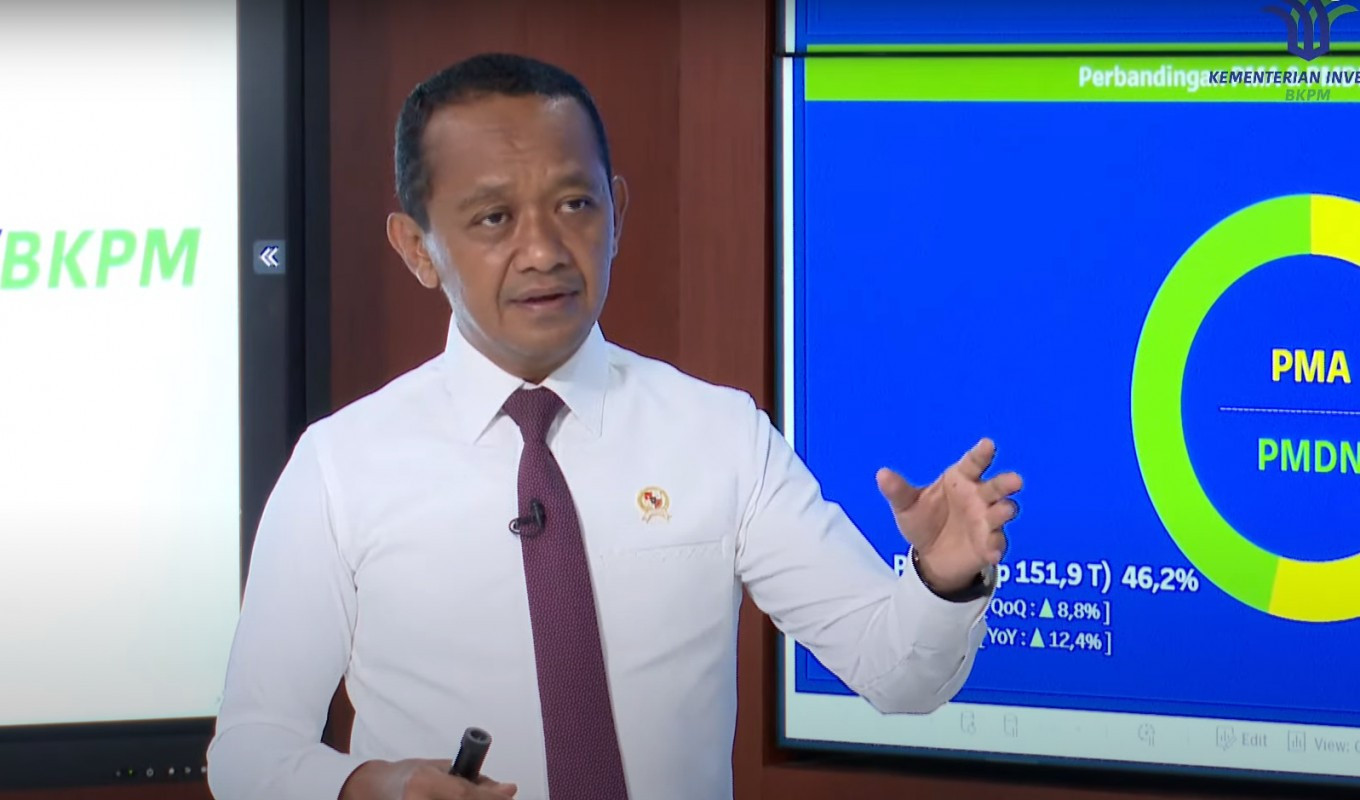News
House approves KEN, prioritizing energy security over decarbonization
Tenggara Strategics February 13, 2025 Investment Minister Bahlil Lahadalia speaks on April 28, 2023, during a press conference in this screenshot from the Investment Ministry's Youtube account. (YouTube/Investment Ministry/-)
Investment Minister Bahlil Lahadalia speaks on April 28, 2023, during a press conference in this screenshot from the Investment Ministry's Youtube account. (YouTube/Investment Ministry/-)
The House of Representatives Commission XII overseeing energy has approved a draft government regulation on the National Energy Policy (KEN), which carries a less ambitious decarbonization target. The new policy postpones the 23 percent share of renewable energy in the national energy mix to 2030 from its original target of 2025, while the share of coal is projected to rise from 39.48 percent last year to 40.7 percent in 2030.
The draft regulation, intended to replace Government Regulation No. 79/2014 on KEN, was initially approved in September 2024 by the House’s energy commission under the previous administration. After the October inauguration of President Prabowo Subianto , the Energy and Mineral Resources Ministry revised the draft in line with the new administration’s policies and programs, especially the national energy resiliency agenda and its aim to achieve 8 percent economic growth by 2029. The revised draft was then resubmitted for approval to House Commission XII, which now oversees energy and mineral resources.
According to energy minister Bahlil Lahadalia, the draft was revised in reference to studies by the National Development Planning Agency (Bappenas), the National Energy Council (DEN), the Institute for Development of Economics and Finance (INDEF) and the Bandung Institute of Technology. These studies indicated that 8 percent economic growth and energy self-sufficiency were achievable, provided that the energy sector played a key role in supporting industrial expansion.
Though Indonesia is committed to global decarbonization efforts, the revised draft regulation introduces greater flexibility in implementing the energy transition. Article 7e explicitly states that the transition to reach net-zero emissions (NZE) by 2060 must not compromise energy security and self-sufficiency, effectively allowing room for policy adjustments if decarbonization efforts are deemed to hinder the Prabowo administration’s energy agenda.
The latest version of the draft KEN regulation stipulates a more relaxed pace of renewable energy expansion, pushing back the goalpost for 23 percent renewables in the national energy mix from this year to 2030, and gradually increasing to 72 percent by 2060. Biomass is expected to lead renewables in the energy mix by 2030 at 9 percent, followed by biofuel (5 percent), geothermal energy (4 percent), hydropower (2.3 percent) and solar (1.6 percent). This reflects the government’s preference for dispatchable renewable sources that can ensure stable power generation, such as biomass and geothermal energy, over intermittent sources like solar and wind.
Despite the incremental push for renewables, coal will continue to dominate Indonesia’s energy sector in the coming years. According to the draft policy, electricity generation from coal will increase from 39.48 percent in 2024 to 40.7 percent in 2030 toward a gradual decline to 7.8 percent by 2060, while oil is expected to dip from 29.9 percent last year to 22.4 percent in 2030, before declining to 4.7 percent by 2060. The continued reliance on coal reflects a reluctance to phase out fossil fuels too quickly, with the government citing affordability, availability and energy security as related concerns. To reconcile this with Indonesia’s decarbonization commitment, the government plans to use low-carbon technologies at coal-fired power plants to allow for a gradual transition while minimizing economic disruptions.
The House’s approval of the draft KEN regulation also means the government must adjust its policy framework on electricity generation, such as the 2024-2060 National Electricity Master Plan (RUKN), issued on Nov. 29 by the Energy and Mineral Resources Ministry. This is mandated in a Constitutional Court ruling issued on the same day, that the RUKN must be in alignment with the KEN and legislative approval is required for its issuance. The ruling strengthens legislative oversight over the national electricity plan, potentially affecting state electricity company PLN’s long-term electricity supply business plan (RUPTL) and investment strategies in renewable energy and power infrastructure.
What we've heard
A source at Commission XII revealed that a key reason behind the swift approval of the draft KEN regulation was Article 7e, which allows the government the flexibility to revise the energy transition targets if it deemed to pose a risk to energy security and self-sufficiency.

